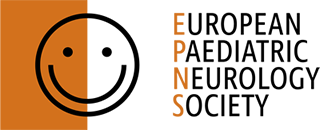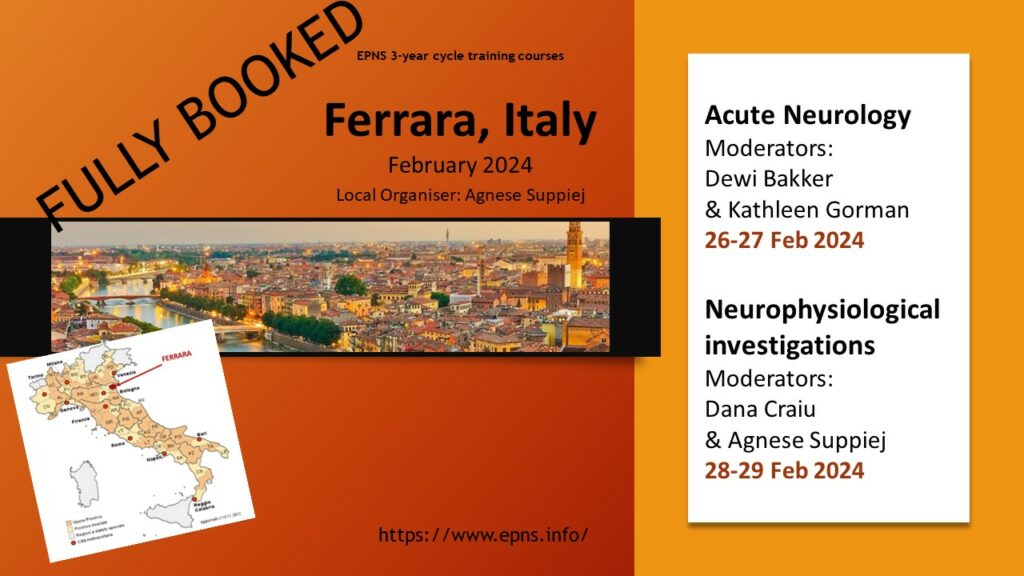Acute Neurology 26-27 February 2024
Neurophysiological Investigations 28-29 February 2024
The 2024 cycle of training courses took place in Ferrara, the splendid city of art, the magnificent Renaissance capital and a UNESCO World Heritage location.
Sincere thanks to Dana Craiu and Agnese Suppiej for their organisation, the 4 moderators for their facilitation and all the faculty members for delivering an excellent programme.
Many thanks to all the participants for getting involved – we hope new friendships and networks have been nurtured.
Acute Neurology
Monday 26 and Tuesday 27 February 2024: 12.5 European CME credits (ECMEC®s)
The acute neurology course focused on the common and acute paediatric neurological disorders that are encountered by paediatricians and paediatric neurologists in the emergency department. This course focused on the assessment, investigation and management of acute paediatric neurological disorders including status epilepticus, childhood stroke and acute gait disorders. The course was a combination of interactive lectures and small group work
Programme: CLICK HERE
Moderators: Dr Dewi Bakker and Dr Kathleen Gorman
Faculty (in alphabetical order):
| Dewi | Bakker |
| Dana | Craiu |
| Lucia | Gerstl |
| Rafaele | Farsaperla |
| Kathleen | Gorman |
| Jelte | Helfferich (virtual) |
| Alasdair | Parker |
| Agnese | Suppiej |
Neurophysiological Investigations
Wednesday 28 and Thursday 29 February 2024 14.5 European CME credits (ECMEC®s).
Neurophysiological investigations in paediatric neurology mainly covered EEG, EMG and evoked potentials and their use in paediatric neurology. The students learned basic information on EEG – how to use it to diagnose epilepsy and epileptic syndromes, or other neurological disorders, including acutely ill patient in ICU, neurodegenerative disorders. Information on the use of SEEG for epilepsy surgery and advanced techniques of postprocessing, together with the limits of EEG use will be presented. The EMG role in diagnosing neuro-muscular disorders (horn, roots, junction, muscle, nerves) will be based on clinical examples. Evoked potentials – the types, the use in usual neurological practice and intraoperative use of EP monitoring was discussed.
Programme: CLICK HERE
Moderator: Professor Dana Craiu and Professor Agnese Suppiej
Faculty (in alphabetical order)
| Carmen | Barba |
| Jay | Capone |
| Dana | Craiu |
| Rafaele | Farsaperla |
| Cristina | Forest |
| Paola | Lanteri |
| Silvia | Lori |
| Agnese | Suppiej |
| Oana | Tarta Arsene |
Participants had to be EPNS members who had paid their current membership fee to attend EPNS training courses.
Registration and Fees
| fee no accommodation | Fee with accommodation (single room use) | Fee (with room for double or twin use) – per person | |
| 2 courses (2 social events) | € 677.5 | € 1,024 (4 nights) | € 908 (4 nights) |
| 2 courses (2 social events) additional night at the hotel | n/a | € 1,110 (5 nights) | € 965 (5 nights) |
| Single course (1 social event) | € 465 | € 638 (4 nights) | € 580 (4 nights) |
| Single course (1 social event) additional night at the hotel | n/a | € 725 (5 nights) | € 638 (5 nights) |
| Accompanying person – 2 courses | n/a | n/a | € 365 (4 nights) |
| Accompanying person – 2 courses, additional night | n/a | n/a | € 422 (5 nights) |
| Accompanying person – single course | n/a | n/a | € 200 (4 nights) |
| Accompanying person – single course, additional night | n/a | n/a | € 258 (5 nights) |
- Registration fee did not include travel insurance.
- Participants had to arrange their own travel and were advised to purchase personal travel insurance.
- The accompanying person fee was for non-academic participants (spouses, partners, children, etc.) and enabled them to participate in the social events.
Case Presentation Submissions
Registered participants were invited to SUBMIT case presentations. It was not mandatory to submit a case presentation unless in receipt of a bursary award. Presentations MUST NOT include patient information/pictures without the appropriate consent. Only one presentation can be sent per participant per 2-day course. Selection of successful cases was completed by the moderators who also decided when and where the case presentations will take place. Candidates were notified by email about the outcome of their submission after the closing date. Successful candidates were given more information about when their presentation will take place after they have received the outcome of their submission.
Case Presentations for Acute Neurology Course: 26-27 February 2024
Cases had to be submitted as a PowerPoint presentation with a maximum 6 PowerPoint slides (including title slide):
- Slide 1: Title slide: Case Name, Doctor’s name, Doctor’s Hospital, location, and country.
- Slides 2 to 6: give details of the story:
- Minimum font size 28
- Only 7 lines
- Black on white
- Penultimate slide with differential thoughts, discussion points
- Last slide brief summary
Both solved and unsolved cases were welcome.
Registered delegates were sent a link to upload their case presentations by email. During the upload, delegates were required to select which sub group their presentation relates to from these 4 categories: Status Epilepticus, Neurovascular Emergencies, Movement Disorder Emergencies, Child with reduced GCS.
Case Presentations for Neurophysiological Investigations: 28-29 February 2024
Only EEG-short case presentations were invited.
- EEG had to be saved in a denominated format, preferably EDF, but also EEG-to-Go or Export viewer files are good options
- To support your EEG file, a short (half page) description of the case with motivation had to be sent – why did you choose the EEG – what will be the learning objective of that case?
Registered delegates were sent a link to upload their EEG-short case presentation.
The EPNS Education and Training commission selected the EEG cases to be discussed during the course .The selected EEGs were made available to all participants 1 month before the course in order everybody to look over and make an impression.
During the course, selected EEGs were discussed together during breakout rooms
Prizes
2 prizes were awarded, one per two day course for the BEST CASE PRESENTATION. The prize will be a certificate and a bursary to attend the EPNS Training Course Ferrara 2025.
Special congratulations to the prize winners:
- Ann-Louise Esserlind: Best Case presentation: Acute Neurology course
- Marijke Gielen: Best Student contribution: Neurophysiological Investigations course
EACCME® accreditation:
The EPNS Training Course Ferrara Acute Neurology, Ferrara, Italy 26/02/2024 – 27/02/2024, has been accredited by the European Accreditation Council for Continuing Medical Education (EACCME®) with 12.5 European CME credits (ECMEC®s). Each medical specialist should claim only those hours of credit that he/she actually spent in the educational activity. Through an agreement between the Union Européenne des Médecins Spécialistes and the American Medical Association, physicians may convert EACCME® credits to an equivalent number of AMA PRA Category 1 CreditsTM. Information on the process to convert EACCME® credit to AMA credit can be found at https://edhub.ama-assn.org/pages/applications. Live educational activities, occurring outside of Canada, recognised by the UEMS-EACCME® for ECMEC®s are deemed to be Accredited Group Learning Activities (Section 1) as defined by the Maintenance of Certification Program of the Royal College of Physicians and Surgeons of Canada.
The EPNS Training Course Ferrara Neurophysiological Investigations, Ferrara, Italy 28/02/2024 – 29/02/2024, has been accredited by the European Accreditation Council for Continuing Medical Education (EACCME®) with 14.5 European CME credits (ECMEC®s). Each medical specialist should claim only those hours of credit that he/she actually spent in the educational activity. Through an agreement between the Union Européenne des Médecins Spécialistes and the American Medical Association, physicians may convert EACCME® credits to an equivalent number of AMA PRA Category 1 CreditsTM. Information on the process to convert EACCME® credit to AMA credit can be found at https://edhub.ama-assn.org/pages/applictations. Live educational activities, occurring outside of Canada, recognised by the UEMS-EACCME® for ECMEC®s are deemed to be Accredited Group Learning Activities (Section 1) as defined by the Maintenance of Certification Program of the Royal College of Physicians and Surgeons of Canada.
Destination:
- Ferrara is a splendid city of art, to be enjoyed by walking its streets, its character – this magnificent Renaissance capital – revealed on every corner. Through its glorious past, you can understand the roots of its present.
- The Este family governed here for three centuries and gave the city the appearance it has today: a uniquely planned city, harmoniously fusing Mediaeval and Renaissance architecture, Europe’s first modern city. It is precisely these characteristics that secured its UNESCO World Heritage status.
- It’s a peaceful city to wander on foot or by bike, every step re-living the magical atmospheres of the past.
- download a tourist map
How to get to Ferrara:
The easiest and fastest way to reach Ferrara is flying to Bologna airport. Indeed, this is the closest airport to the city (about 45 km), even though other solutions are possible, such as flying to Venice, Verona or Milan Bergamo airports as well.
Venue:
Azienda Ospedaliero-Universitaria di Ferrara, Via Aldo Moro, 8 – 44124 Cona – Ferrara
The University Hospital of Ferrara is formed by the Arcispedale “Sant’Anna” in Cona (a fraction of the Municipality of Ferrara). The Cona Hospital is the hospital of the city of Ferrara, a highly specialized reference (Hub) for provincial healthcare and for the management of acute pathologies.
The S. Anna is the site of the degree courses in Medicine, Pharmacy and Prevention of the University of Ferrara.
Accommodation:
Participants can book the room for the event, filling the registration form or writing to accommodation@epnsferrara.eu
The Organizing Secretary offer accommodation services during the event days at preferential rates in hotels near the city center of Ferrara
Social Programme
Monday 26 February 2024: ‘monument chasing’ followed by dinner at Palazzo della Racchetta
Wednesday 28 February 2024: learn Italian cooking Ferrara style, followed by a gala dinner

